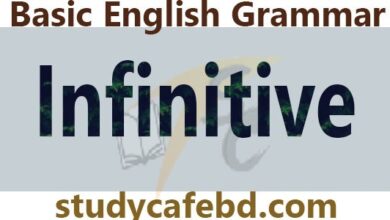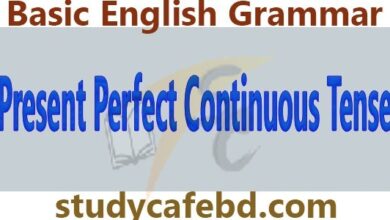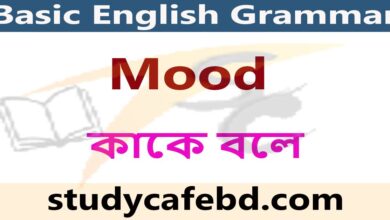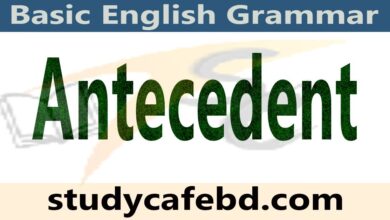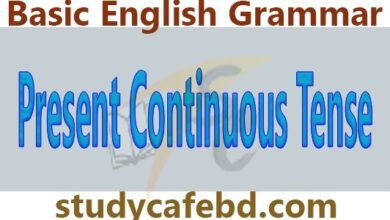Sentence কাকে বলে কত প্রকার ও কি কি ও Sentence এর 10 টি Basic Pattern
Table of Contents
Sentence বা বাক্য কাকে বলে ও Sentence এর কিছু Basic Pattern
যে শব্দ বা সমষ্টি কোন একটি প্রসঙ্গে পরিস্কার অর্থ প্রকাশ করে, কাকে Sentence বলে।
More Definition of Sentences
If some words being combined make a complete sense is called sentence.
Dr. Sazzad Hossain
Note: মনে রাখবেন Sentence এর সাধারনত তিনটি Components থাকে।
সেগুলো হল: Subject + verb + adverbials (manner + place + time)
যেমন:
- He sang sweetly ( manner) in the television (place) last night (time)
Note: এক পদ বিশিষ্ট বাক্য এবং verb হীন বাক্য আধুনিক গ্রামারে গ্রহনযোগ্য।
যেমন:
Mother: Have you taken your meal? [multi worded sentence]
Son: Yes [single word sentence]
Mother: All right [verbless sentence]
একটি Sentence এ মূলত দুটি অংশ থাকে
- Subject
- Predicate
01. Subject কাকে বলে?
সাধারণত verb কে “কে” দ্বারা প্রশ্ন করলে Subject পাওয়া যায়। তবে verb টি যদি have verb হয় সেক্ষেত্রে verb কে “কার” দ্বারা প্রশ্ন করলে subject পাওয়া যায়।
ইংরেজি বাক্যে Subject অতি গুরুত্বপূর্ণ একটি বিষয়। প্রায় সকল Sentence এ Subject এর ব্যবহার আছে। আবার Subject অন্যান্য উপাদানের উপর বিশেষ প্রভাব বিস্তার করে। তাই Subject সম্পর্কে স্পষ্ট জ্ঞান থাকা আবশ্যক। আমরা এখানে সংক্ষেপে Subject নিয়ে আলোকপাত করার চেষ্টা করতেছি ।
যেমনঃ
- Rakin is reading a book.
- Shanta plays football.
- Rumu sings a song.
বাক্য তিনটির verb কে এখন আমরা ‘কে’ দ্বারা প্রশ্ন করব।
কে পড়ে – Rakin পড়ে। অর্থাৎ Rakin এখানে Subject হিসেবে আছে।
কে খেলে- Shanta খেলে। অর্থাৎ Shanta এখানে Subject হিসেবে আছে।
কে গায়- Rumu গায়। অর্থাৎ Rumu এখানে Subject হিসেবে আছে।
আরও কিছু Example দেখা যাকঃ
- Rahat is a beautiful girl.
- She has a purse.
- Shamim is very active.
এবার দেখা যাক কিভাবে Sentence গুলো থেকে Subject বের করা যায়। কে হয় (রূপসী) – Rahat হয় রূপসী। অর্থাৎ Rahat এখানে Subject হয়েছে।
কার (পার্স ) আছে – She বা তার পার্স আছে। অর্থাৎ She এখানে Subject হয়েছে। কে হয় (কর্মঠ) – Shamim হয় কর্মঠ। Samia এখনে Subject হয়েছে।
02. Predicate কাকে বলে?
যা subject বা কর্তা সম্পর্কে বলে বা করে বা লিখে তাকে Predicate বলা হয় ।
SUBJECT PREDICATE
[su_table responsive=”yes”][su_table]| No | Subject | Predicate |
| 1 | I | Read in this school |
| 2 | They | Know me |
| 3 | She | Dance |
| 4 | This | is a toy |
| 5 | Man | is mortal |
| 6 | We | have a cow |
| 7 | Mother | cooks rice |
উপরের example-এর থেকে খুজে পাওয়া verbগুলি হল read, know, dances, cooks ইত্যাদি।
আর object গুলি হল me, a cow and rice.
Object কাকে বলে?
ইংরেজিতে object হল সেই সকল noun বা pronoun যাদেরকে কেন্দ্র করে subject বা কর্তা তার action বা কাজ সম্পন্ন করে থাকে অর্থাৎ যে ব্যক্তি বা বস্তু subject এর কাজ “verb” গ্রহণ করে সেটিই হল বাক্য বা sentence এর object.
এক্ষেত্রে মনে রাখতে হবে, noun কিংবা pronounই বাক্যের object হিসেবে ব্যাবহারিত হতে পারে।
উদাহারণ স্বরূপ বলা যায়ঃ
- I am teaching object in the class.
- She is learning English now.
- Yesterday, Paul told me an interesting story that gave me much pleasure.
উপরের প্রথম ও দ্বিতিয় উদাহারণে “object এবং English” বস্তুগত noun দুটি যথাক্রমে “teach এবং learn” action বা verb দুটির object বা receiver. আর তৃতিয় উদাহারণটিতে “me, an interesting story, me, much pleasure” ব্যক্তি ও বস্তুবাচক শব্দ গুলো একিভাবে “told এবং gave” verb দুটির object.
Object প্রধানত ২ প্রকার।
যথা
- direct object “যা কোনো বস্তুকে বুঝায়”
- indirect object “যা ব্যক্তি বা প্রাণিকে বুঝায়”.
যেমন
- Raka is catching fish. “indirect object”
- He bought a luxurious dress. “direct object”
Some other single-worded sentences
Assertive sentence: Yes. No. Certainly. Impossible etc.
Interrogative sentence: Why? Where? What? etc.
Imperative Sentence: Come. Look. Halt. Stop. etc
Exclamatory Sentence: Hallo! Good! Bravo! Hurrah!
অর্থগতভাবে Sentence বা বাক্য পাচ প্রকার।
যথা:
- Assertive Sentence
- Interrogative Sentence
- Imperative Sentence
- Optative Sentence
- Exclamatory Sentence
Assertive Sentence কাকে বলে?
যে Sentence দ্বারা কোন কিছু সম্পর্কে বিবৃতি প্রকাশ করে, তাকে Assertive Sentence বলে।
যেমন:
- We learn English Everyday.
- He is a good student.
Assertive Sentence কে ০২ (দুই) ভাগে করা হয়।
যথা:
- Affirmative Sentence
- Negative Sentence
Affirmative Sentence কাকে বলে?
যে sentence হ্যাঁ বোধক অর্থ প্রকাশ করে, তাকে Affirmative Sentence বলে।
যেমন:
- I read a book.
- Dhaka is the capital of Bangladesh.
Negative Sentence কাকে বলে?
যে sentence দ্বারা না বোধক অর্থ প্রকাশ করে, তাকে Negative Sentence বলে।
যেমন:
- He does not come here.
- We do not play football.
Interrogative Sentence কাকে বলে?
যে Sentence দ্বারা কোন প্রশ্ন জিজ্ঞাসা করা বোঝায়, তাকে Interrogative Sentence বলে।
যেমন:
- What class do u read in?
- What is your name?
- তুমি কি আমাকে চেন?- Do you know me?
- তুমি আমাকে চেন না?- Do you not know me?
গঠন:
Interrogative sentence এ subject এর পূর্বে অবশ্যই একটি Auxiliary verb বসবে।
তবে Present Indefinite এবং Past Indefinite Tense এ কোন auxiliary verb থাকে না। বাকী ১০টি tense এ অবশ্যই এক বা একাধিক auxiliary verb থাকে এবং subject এর পরে auxiliary verb টির অথবা যে কোন verb এর finite form (অর্থাৎ Present বা Past form) হবে।
সুতরাং, যে সকল sentence এ subject এর পরে auxiliary verb থাকে, সে sentence গুলোকে Interrogative করতে শুধুমাত্র auxiliary verb কে subject এর পূর্বে এনে বসাতে হবে।
Present ও Past Indefinite Tense এর ক্ষেত্রে (যেহেতু কোন auxiliary verb থাকে না) ‘to do’ auxiliary verb টি subject এর পূর্বে বসবে এবং মূল verb এর bare indefinite form হবে।
Interrogative sentence এ subject এর পূর্বে অবশ্য্ই একটি Auxiliary verb থাকতে হবে।
Present ও past indefinite tense এ auxiliary verbথাকে না বলে যথাক্রমে do বা did ব্যবহার করতে হবে।
উহা subject এর পূর্বে বসবে এবং verb এর bare infinitive form হবে। অন্যান্য tense এ অবশ্যই এক বা একাধিক auxiliary verb থাকে এবং finite form এর auxiliary verb টিকে subject এর পূর্বে এনে বসালেই sentence টি Interrogative হয়ে যায়।
যেমনঃ-
- You Know me. (Present Indefinite)- Assertive.
- Do you Know me? (Present Indefinite)- Interrogative.
- He went there. (Past Indefinite)- Assertive.
- Did he go there? (Past Indefinite)- Interrogative.
- He is going. (Continuous)- Is he going?
- I shall go. (Future)- Shall I go?
- He has gone. (Perfect)- Has he gone?
বাক্যে ‘কে’, ‘কোথায়’, ‘কেন’, ‘কোনটি’, ‘কেমন’ ইত্যাদি প্রশ্নবোধক শব্দ থাকলে ইংরেজীতে sentence এ ‘who’, ‘where’, ‘why’, ‘which’, ‘how’, ‘when’ ইত্যাদি word গুলো অর্থ অনুযায়ী বসবে। এ গুলোকে WH-word বলে। কারন, প্রত্যেকটি word য়েই WH- আছে।
WH-word সব সময়ই sentence বা clause এর শুরুতে বসে। তবে WH-word থাকুক বা না থাকুক, interrogative এর মূল signal হচ্ছে Subject এর পূর্বে একটি auxiliary verb । Subject এর পূর্বে auxiliary verb না থাকলে তা interrogative sentence হবে না।
- তুমি কি খাও? Do you eat?(‘কি’ এখানে গুরুত্ব হীন)
- তুমি কি খাও? What do you eat?(‘কি’ এখানে গুরুত্ববহ)
- তুমি কেন এসেছ? Why have you come?
- তাহারা কোথায় যাচ্ছে? Where are they going?
- তুমি কিভাবে এসেছিলে? How did you come?
তবে Subject যখন WH-word বা WH-phrase হয়, তখন উহার পূর্বে Auxiliary verb বসে না।
যেমনঃ Who went there? অথবা, Who is there? What happened to you? ইত্যাদি।
Imperative Sentence কাকে বলে?
যে Sentence দ্বারা আদেশ, নিষেধ, অনুরোধ, প্রস্তাব ও অনুমতি প্রকাশ পায়, তাকে Imperative Sentence বলে।
যেমন:
- Do the work.
- Let me go now.
Some Examples:
1. এদিকে এসো – Come here.
2. কলমটি আন – Bring the pen.
3. বাইরে যাও – Go out.
4. মিথ্যা বলিবে না – Do not tell a lie.
5. মিথ্যা বলা মহাপাপ – To tell a lie is a great sin.
7.এখান থেকে বের হয়ে যাও – Get out from here.
8. বের হও – Get out.
9. আমাকে ফোন করার চেষ্টা করবে না – Do not try to call me.
10. কখনো আমার বাড়িতে আসার চেষ্টা করিবে না – Never try to come my house.
Optative Sentence কাকে বলে?
যে দ্বারা মনের ইচ্ছে, বাসনা, কামনা ও প্রার্থনা প্রকাশ করে, তাকে Optative Sentence বলে।
যেমন:
- May Allah bless you.
- Long live out principle.
সাধারনত: Optative Sentence এর শুরুতে ‘May’ modal বসে।
Structure: May+ subject+ verb+ extension.
- May you prosper day by day.
Example:
- May you live long.
- May Allah bless you.
- Wish you all the best.
- Long live Bangladesh (can be formed without ‘may’)
Exclamatory Sentence কাকে বলে?
যে Sentence দ্বারা আকস্মিক ভাব, বিস্ময়, আনন্দ প্রকাশ করে, তাকে Exclamatory Sentence বলে।
যেমন:
- What a beautiful bird it is!
- Hurrah! We have won!
- Alas! He is dead.
Exclamatory sentence এর শুরুতে আবেগ সূচক Word অর্থাৎ একটি Interjection বসবে।
উপরের sentence টি থেকে ‘Alas!’ শব্দটি (Interjection) বাদ দিলে He is dead -Assertive sentence হয়ে যায় ।
‘What’ এবং ‘How’ WH- word দুটিও Exclamatory sentence এ ব্যবহৃত হয়।
যেমন:-
- What a nice bird it is!
- How nice the bird is!
Sentence দুটিতে What এবং How (কি এবং কত) কোন প্রশ্ন করেনি। উহারা অত্যাধিক সৌন্দর্য প্রকাশ করতে ব্যবহৃত হয়েছে। অর্থাৎ, উহারা সৌন্দযে©র আধিক্য প্রকাশ করতে ব্যবহৃত হয়েছে।
What এখানে Adjective এবং How এখানে Adverb রূপে বসেছে। Sentence দুটোকে Assertive করলে উহাদের পরিবর্তে verb, adverb বসে।
যেমন:-
- It is a very nice bird.এবং
- The bird is very nice.
সুতরাং, Exclamatory sentence য়েও ‘What’ এবং ‘How’ শব্দ দুটি আধিক্য বোঝাতে যথাক্রমে Adjective ও adverb রুপে (nice কে qualify বা modify করতে) ব্যবহৃত হয়।
তবে এ ধরনের sentence এ subject এর পূর্বে কোন auxiliary verb বসবে না।
Subject এর পূর্বে auxiliary verb বসলে, তা অবশ্যই Interrogative হবে।
যেমনঃ-
- How long it is! ইহা কত লম্বা!(অর্থাৎ, অনেক লম্বা) Exclamatory Sentence.
- How long is it? ইহা কতটুকু লম্বা? Interrogative Sentence (প্রশ্ন বুঝাচ্ছে – অর্থাৎকতটুকু লম্বা তা পরিমাপ করে দেখতে হবে)
Subject ‘it’ – এর পূর্বে ‘is’ auxiliary verb বসছে। সুতরাং, উহা Interrogative sentence.
WH–word (WHAT এবং How) Interrogative এবং Exclamatory উভয় প্রকার sentence এর শুরুতে বসে। পার্থক্য শুধু এই যে, Exclamatory Sentence এ subject এর পূর্বে কোন auxliliary verb বসে না।
কিন্তু, Interrogative sentence এ subject এর পূর্বে অবশ্যইauxiliary verb বসবে। Exclamatory sentence এ ‘What’ এবং ‘How’ আসলে Interjection এর effect আনে।
Structure: (গঠন প্রণালী)
what a/an বা how+ adjective+ sub. + verb+ ext.
- What a fine bird it is !
- How beautiful you are !
Alas/Hurrah এর জন্য:
Structure: Alas/Hurrah+!+sub.+ verb+ extension.
- Alas ! I am undone!
If/had এর জন্য:
Structure: If/had+ subject+ verb+ extension+!
- If I were a king !
Exclamatory is a sentence which expresses strong/sudden feeling or emotion like surprise, pain, delight, anger, disgust etc.
Structure: গঠন প্রণালী
Alas/ Hurrah/ Bravo/ What/ How etc. + Others
Example:
- Hurrah! Our cricket team has won the series.
- Alas! He has failed the competition.
- Bravo! You have done a great job.
- What a talent-full girl she is!
- How sweetly the cuckoo sings!
- What a wonderful land Bangladesh is!
- Were I a Super Hero!
- What a pity!
- Fantastic!
- What an idea!
- Put that down now!
- Leave the package at the door.
- Walk softly, please.
গঠন অনুযায়ী Sentence বা বাক্য তিন প্রকার।
যথা:
- Simple Sentence
- Compound Sentence
- Complex Sentence
Simple Sentence কাকে বলে?
যে sentence এ একটি মাত্র Subject ও একটি মাত্র Finite Verb থাকে, তাকে Simple Sentence বলে।
যেমন:
- Killing the bird, the old man bought bad luck, to the crew.
- Because of my illness, I could not go to the collage.
Compound Sentence কাকে বলে?
যে Sentence দুই বা ততোধিক Principle Clause’ and, but, or yet, so, therefore, not only-but also ইত্যাদি Co-ordinating Conjunction দ্বারা যুক্ত হয়, তাকে Compound Sentence বলে।
যেমন:
- He is rich but he is unhappy.
- He ran fast but he could not get the train.
[su_box title=”নিচের শব্দগুলি Compound Sentence এ ব্যবহৃত হয়।” style=”glass” box_color=”#0b0401″ title_color=”#f6f0f1″]and, as well as, but, both, Consequently, However, Either-or, Neither-nor, nevertheless, or , otherwise, shall, so, therefore, while, whereas, yet, not only- but only.[/su_box]
Complex Sentence কাকে বলে?
যে Sentence এ একটি মাত্র Principle Clause এবং এক বা একাধিক Sub-ordinate clause থাকে, তাকে Complex Sentence বলে।
যেমন:
- We eat food so that we may live.
- He is took weak that he cannot walk.
[su_box title=”নিচের শব্দগুলি Complex Sentence এ ব্যবহৃত হয়।” style=”glass” box_color=”#0b0401″ title_color=”#f6f0f1″]As, As- so, Although, as-as, Because, Before, Even though, Even if, However, lest, so-as, Since, So that, Though, Till, That, Until, Unless, While, What, Why, Whom, Where, When, Which, Who, Whoever, Wherever, In order that, If.[/su_box]
*উপরোক্ত ০৩(তিন) প্রকার Sentence ছাড়াও আরও চার প্রকার Sentence আছে।
- Multiple Sentence
- Double Sentence
- Mixed Sentence
- Emphatic Sentence
Multiple Sentence কাকে বলে?
যে Sentence দুইয়ের অধিক Co-Ordinate Clause দ্বারা যুক্ত হয়, তাকে Multiple sentence বলে।
যেমন:
- Kamal was an officer at Rajsahi and he invited all of us to spend the winter holidays with him but only one of un went there.
Double Sentence কাকে বলে?
দুটি Co- ordinate Clause দ্বারা যুক্ত Compound Sentence কে Double Sentence বলে।
অর্থাৎ যে Sentence এ দুটি Co-Ordinate Clause থাকে, তাকেই Double Sentence বলে।
যেমন:
- I went to the market and bought some books.
Mixed Sentence কাকে বলে?
Simple + complex, Complex + Simple অথবা Complex+ Complex যুক্ত হয়ে যদি কোন Sentence গঠিত হয়, কাকে Mixed Sentence বলে।
যেমন:
- Simple + Complex:
He knows me but he does not know where I live.
- Complex + Simple:
You may do as you like but (you) do not come to me again.
- Complex + Complex:
Work while you work and play while you play.
Emphatic Sentence কাকে বলে?
যে Sentence দ্বারা জোর প্রকাশ পায়, তাকে Emphatic Sentence বলে।
যেমন:
- I do believe it.
- I do go there.
Sentence এর কিছু Basic Pattern
অন্যান্য ভাষার মত ইংরেজীতে অনেক Pattern এর বাক্য আছে।
এখানে ০৯ (নয়টি) Basic Sentence Pattern দেখানো হল-
Pattern-1:
Subject + Intransitive verb
ex:
- Birds fly.
- They sing.
Pattern-2:
Subject + Linking verb + complement (adjective)
ex:
- The boy is very smart.
- He looks handsome.
Pattern-3:
Subject + Linking verb + complement (noun)
ex:
- They are my friends.
- He is a student.
Pattern-4:
Subject + Passive verb
ex:
- This book was written last year.
- This road is repaired every year.
Pattern-5:
Subject + Transitive verb + Object
ex:
- He writes books.
- They enjoyed the party.
Pattern-6:
Subject + Vt + Indirect object + Direct object
ex:
- He gave me a pen.
- I told him a story.
Pattern-7:
Subject + Vt + object + Complement (adjective)
ex:
- We considered him wise
- I want my tea hot.
Pattern-8:
Subject + Vt + Object + Complement(noun)
ex:
- He elected him our chairman.
- He called me a genius.
Pattern-9:
There + be verb + Noun phrase + Adverbial
ex:
- There was a lot of money in his pocket.
- There are many fishes in the river.

